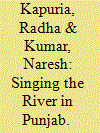|
|
|
Sort Order |
|
|
|
Items / Page
|
|
|
|
|
|
|
| Srl | Item |
| 1 |
ID:
188745


|
|
|
|
|
| Summary/Abstract |
This essay offers an introduction to a special section on ecology and performance in South Asia. Aiming at ‘green’ studies of music and performance, this collection explores intersections between ethnography, history, eco- and ethnomusicology, and film and performance studies by paying particular attention to the ecological turn more broadly visible in South Asian studies. The papers address varied ecological settings of South Asian music and performance, from riverscapes to coastal communities, and from the locations of instrument-makers to negotiations of the climate crisis and the COVID-19 pandemic. The novelty of the section lies not just in mapping the dialogism between ecology and music through reflections on liminality, gender, resistance and identity, but also in bringing forth new archival strategies (digitisation and digital cultures) in conversation with ethnographic findings.
|
|
|
|
|
|
|
|
|
|
|
|
|
|
|
|
| 2 |
ID:
172013


|
|
|
|
|
| Summary/Abstract |
This article focuses on performing artists at the court of Maharaja Ranjit Singh (r. 1801–39), the last fully sovereign ruler of the Punjab and leader of what is termed the Sikh empire. After Ranjit's death, his successors ruled for a mere decade before British annexation in 1849. Ranjit Singh's kingdom has been studied for the extraordinary authority it exercised over warring Sikh factions and for the strong challenge it posed to political rivals like the British. Scholarly exploration of cultural efflorescence at the Lahore court has ignored the role of performing artistes, despite a preponderance of references to them in both Persian chronicles of the Lahore court and in European travelogues of the time. I demonstrate how Ranjit Singh was partial to musicians and dancers as a class, even marrying two Muslim courtesans in the face of stiff Sikh orthodoxy. A particular focus is on Ranjit's corps of ‘Amazons’—female dancers performing martial feats dressed as men—the cynosure of all eyes, especially male European, and their significance in representing the martial glory of the Sikh state. Finally, I evaluate the curious cultural misunderstandings that arose when English ‘dancing’ encountered Indian ‘nautching’, revealing how gender was the primary axis around which Indian and European male statesmen alike expressed their power. Ubiquitous in the daily routine of Ranjit and the lavish entertainments set up for visitors, musicians and female performers lay at the interstices of the Indo-European encounter, and Anglo-Sikh interactions in particular.
|
|
|
|
|
|
|
|
|
|
|
|
|
|
|
|
| 3 |
ID:
188750


|
|
|
|
|
| Summary/Abstract |
This paper traces the centrality of rivers in twentieth-century and contemporary popular music and poetry in the regional context of Punjab in the north-west of the subcontinent. In contrast to the riverine imaginations in the songs of eastern or central India, we look at the very different evocations of rivers—both real and conceptual—in the subcontinent’s north-west. Rivers feature centrally in the love legends, devotional and folk poetry, and songs of Punjab, and here we trace a river-based ‘hydropoetics’ in Punjab, querying land-focused perspectives. From the metaphysical and the sacred to the sensual, and from the realms of the quotidian to those of mourning and trauma, we argue that in Punjab, ‘singing the river’ is central to people’s definitions of regional and ontological identity, and to the way they understand their place in the world.
|
|
|
|
|
|
|
|
|
|
|
|
|
|
|
|
|
|
|
|
|